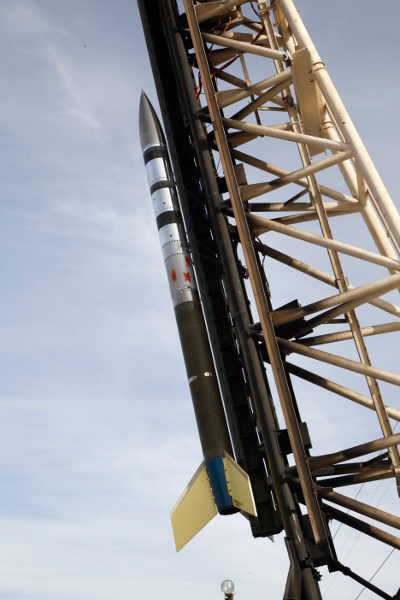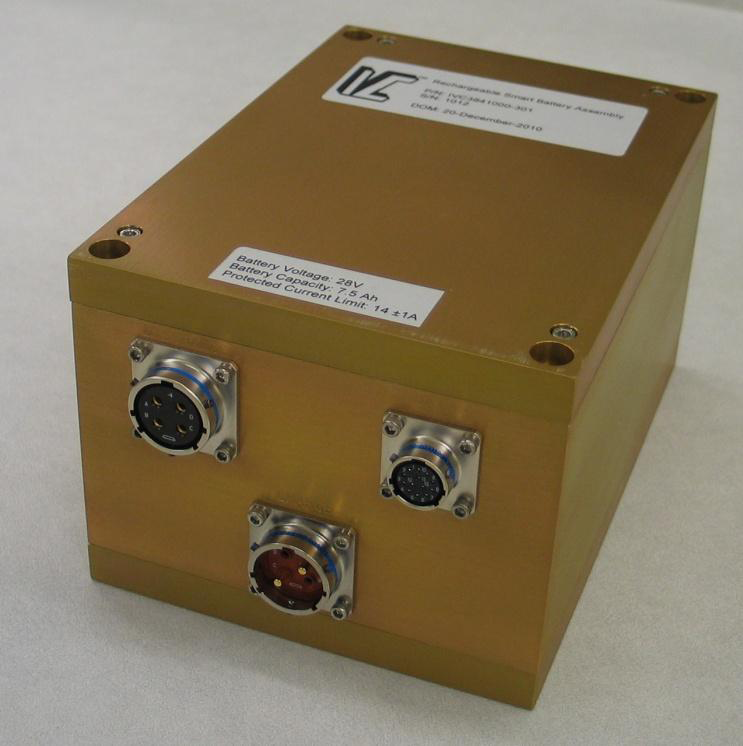August 12, 2015
Rocket Avionics Featured This Week at Symposium in Huntsville

Invocon’s booth display at this week’s Space and Missile Defense Symposium in Huntsville, AL featured a new PCM encoder design that offers a fully-integrated, low-cost, high-performance solution for rocket and missile applications. Invocon’s iPCMe™ encoder was on display in the same section of rocket that flew successfully at White Sands Missile Range in New Mexico. Invocon’s contributions to the flight included both internal and external power, power control, telemetry, radio transmission, and a number of sensors. Power was supplied by Invocon’s Lithium Ion Polymer Smart Battery. The Power Control Assembly (PCA), also an Invocon design, provided the interface to both the UMBI pocket connector for external power and control as well as the Smart Battery for internal power. Symposium attendees were treated to a working demonstration of the system, including real-time video feeds of a locally-mounted camera.
Click here for an in-depth description of the CTREX application
July 31, 2015
Navy Selects Invocon for Safe, Reliable Lithium-ion Battery Development

The US Navy has selected Invocon’s proposal for funding under the Small Business Technology Transfer (STTR) program. Invocon proposed its Lithium-Ion Smart Rechargeable Battery technology as the basis for developing a reliable, safe, robust Battery Management System (BMS). This technology offers an ever vigilant BMS that helps to optimize battery performance, reduce charging cycle time, and increase battery safety during both charging and discharging. The system will be modified to provide additional options such as pressure, humidity, and salt fog detection. Standard interfaces will help to reduce design, manufacturing, and maintenance costs. Invocon is pleased to be working with the Center for Advanced Life Cycle Engineering at the University of Maryland on this project.
Check out our current Smart Battery options: 3.2AH Smart Battery and 7.5AH Smart Battery
May 7, 2015
Invocon at FIIW
Aaron Trott, Program Director at Invocon presented at the Future of Instrumentation and Internet Workshop, held 4-6 May in Arlington, VA. The topic was “Spaceflight Experience in Applying Smart Wireless Sensors: Implications for Passive Wireless Sensor Applications”. The purpose of the presentation was to provide insights from Invocon’s 20 years of experience in providing wireless instrumentation for space vehicles.
April 30, 2015
Wireless Flight Test Instrumentation SBIR Proposal Selected
Invocon’s Small Business Innovative Research (SBIR) proposal for a Wireless Flight Test Instrumentation system was selected by NASA for Phase I funding. Invocon will use this opportunity to build on its rich heritage of wireless flight instrumentation systems to provide NASA and the flight test community with a robust and flexible system that will simplify flight testing of high-performance aircraft.
March 13, 2015
Invocon at Space & Missile Defense Symposium – Huntsville, AL
Invocon will display an array of avionics and flight test hardware at the Space & Missile Defense Symposium 11-13 August 2015. The SMD Symposium, held each year at the Von Braun Center, is the leading educational, professional development and networking event in the space and missile defense community. Invocon’s booth display will include electronics and systems that are used on target missiles for control, monitoring, and impact detection and location.
September 28, 2015
Re-entry Breakup Recorder (REBR-W)
Invocon produced a wireless temperature system that was incorporated into the Reentry Breakup Recorder (REBR), a design that was conceived and constructed by The Aerospace Corporation engineers. REBR is a basketball-sized device that is launched into orbit aboard a larger spacecraft and then intentionally deorbited when a host spacecraft returns to Earth. The REBR gathers data as its host vehicle reenters and transmits the data to the ground for analysis. The data can be used for reentry hazard prediction studies, reducing risks, improving planning for spacecraft that eventually must deorbit, and generally expanding our understanding of reentry breakup and related phenomena. The new REBR-W (wireless) is an enhanced version of this capability that utilizes remotely mounted units with high temperature sensors that are located throughout the host spacecraft. The remote sensors measure and transmit temperature data from various locations on the reentering vehicle to the REBR-W unit, which stores and later transmits the data to the ground. Invocon’s responsibility was defining, producing, and testing a suitable system solution that could be used effectively with REBR on various spacecraft that dock with the International Space Station and later reenter Earth’s atmosphere and burn up.
Invocon has developed more than 25 different wireless sensor system designs that have been used by NASA to measure temperature, vibration, shock, pressure, etc. on the Shuttle and the International Space Station. The company is pleased to be a contributor to this project and leverage its wireless sensor experience into this system.
